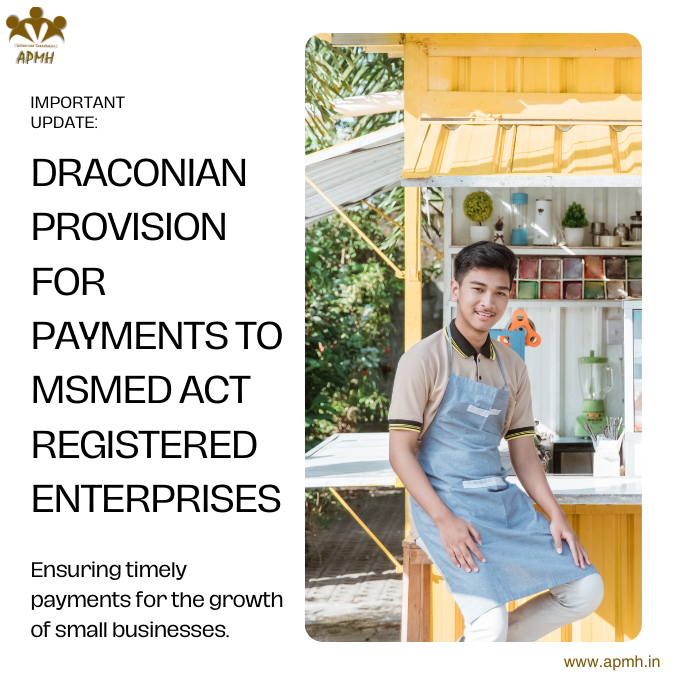22-Feb-2024 New Draconian Provision for Trade and Industry for payments to Micro and Small Enterprises registered under MSMED Act, 2006
#smallbusinesssupport #msmeassistance #regulatorycompliance #complianceservicesExplore the latest tax amendment (Section 43B(h)) catalyzing Micro and Small Enterprises under the MSMED Act, 2006. Unraveling complexities, discover how this change influences deductions for payments and poses intriguing questions for traders under Section 44AD. Stay ahead in the dynamic tax landscape.

To provide boon/incentives to Micro and Small Enterprises an amendment has been introduced in section 43B of the Income Tax Act, 1961 by way of insertion of new clause (h) in the said section.
Let us understand what this provision has in store for enterprises purchasing goods / availing services from Micro and Small Enterprises registered under MSMED Act, 2006
Understanding Section 43B
Section 43B of the Income Tax Act, 1961 deals with certain deductions that are allowed only on an actual payment basis irrespective of when they are accrued or incurred.
In a nutshell, the deduction referred to under this section is allowed as expenditure on a payment basis irrespective of their accrual. However, the assessee is allowed time to pay these amounts before he files his return of income or the due date of filing his return of income.
Insertion of clause (h) of Section 43B.
The government, based on their stated policy of promoting Small and Micro Enterprises, added this category by providing that any payment outstanding beyond a specified period (generally 45 days) to Micro and Small Enterprises (Medium Enterprise is excluded) would not be allowed as a deduction for the said year. The said deduction would be allowed to enterprise on an actual payment basis in subsequent years. The following instances would not be affected by the said provision:
1) All the delays that have occurred during the year but payment thereof is already made before the Balance sheet date.
2) Outstanding as on Balance sheet date which has not hit the specified date but subsequently paid within the specified period. Payments not made subsequently within the specified time frame would suffer disallowance in the year of purchase.
For example,
1. A enters into a purchase transaction with an enterprise registered under the MSMED Act, 2006 on 10th April 20X1. The payment against the same was made on 10th September 20X1 (Which is after 153 days). However, as the payment is made before the end of the year, despite the delay in payment, the same will be allowed as a deduction.
2. B enters into a purchase transaction with an enterprise registered under the MSMED Act, 2006 on 10th March 20X1. The payment against the same is made on 15th April 20X2 i.e. within the specified time limit as per Section 15 of the MSMED Act, 2006. The same will not attract disallowance even though payment is made after the Balance sheet date as the payment is made within the specified time limit.
SECTION 15 OF MSMED ACT, 2006.
Section 15 of the MSMED Act deals with the delayed payment to MSMEs by the buyer.
As per this section, the buyer is liable to make payment to the supplier within 15 days if there is no agreed date of payment or a maximum period of 45 days when the period is agreed.
If a buyer fails to make payment for goods or services supplied by an MSME, the buyer shall be liable to pay compound interest with monthly rests to the supplier on the amount due. This interest is not allowable as a deduction under section 37(1) of the Income Tax Act, 1961.
MSME CLASSIFICATION.
The new definition of MSME, applicable with effect from 01.07.2020, is based on the composite criteria of turnover limits and limits of investment in plant and machinery or equipment. The same limits apply to both manufacturing enterprises and service enterprises.
The following Table shows the classification of MSMEs into micro, small, and medium categories based on various combinations of situations as regards net investment in plant and machinery or investment and net turnover:
| Sr. No | Type of Enterprise | Investment | Turnover |
| 1. | Micro Enterprise | Not more than Rs.1 Crore | Not more than Rs.5 Crore |
| 2. | Small Enterprise | Not more than Rs.10 Crore | Not more than Rs.50 Crore |
| 3. | Medium Enterprise | Not more than Rs.50 Crore | Not more than Rs.250 Crore |
Traders, depending on their scale of operations and turnover, can fall within any of these categories. They play a significant role in the economy by facilitating the distribution of goods and services, and as such, they are considered an integral part of the MSME sector.
Further, the Circular dated 2nd July 2021 has expressly included traders in the definition of the MSMEs if they fulfill the above-mentioned criteria. However, benefits to Retail and Wholesale trade MSMEs are restricted to Priority Sector Lending only.
This leads us to the following knotty questions:-
Q1. Whether the provisions of Section 43B (h) will apply to traders?
Q2. If an enterprise opts for Section 44AD then, whether Section 43B (h) will still apply to it?
Stay Tuned!
Thank you Readers for your Time and Attention. If you have any questions or suggestions, please don't hesitate to reach out on info@apmh.in / pooja@apmh.in. Your input is invaluable.
